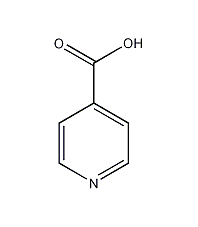
Structural formula
| Business number | 016S |
|---|---|
| Molecular formula | C6H5NO2 |
| Molecular weight | 123 |
| label |
Heterocyclic compounds |
Numbering system
CAS number:55-22-1
MDL number:MFCD00006429
EINECS number:200-228-2
RTECS number:NS1103000
BRN number:109599
PubChem number:24881074
Physical property data
1. Properties: White flaky crystals. Odorless. Can sublime (260?, 2.00kPa).
2. Density (g/mL, 25/4?): Undetermined
3. Relative vapor density (g/mL, air=1): Undetermined
4. Melting point (ºC): 319
5. Boiling point (ºC, normal pressure): Undetermined
6. Boiling point (ºC, 5.2kPa): Undetermined
7. Refractive index: Undetermined
8. Flash point (ºC): Undetermined
9. Specific rotation (º): Undetermined
10. Autoignition point or ignition temperature (ºC): Undetermined
11. Vapor pressure (kPa, 25ºC): Undetermined
12. Saturated vapor Pressure (kPa, 60ºC): Undetermined
13. Heat of combustion (KJ/mol): Undetermined
14. Critical temperature (ºC): Undetermined
15. Critical pressure (KPa): Undetermined
16. Log value of oil-water (octanol/water) partition coefficient: Undetermined
17. Explosion upper limit (%, V/V): Undetermined
18. Lower explosion limit (%, V/V): Undetermined
19. Solubility: Slightly soluble in cold water, more soluble in heat Water, almost insoluble in benzene, ether and boiling ethanol.
Toxicological data
1. Acute toxicity: rat oral LD50: 5mg/kg; mouse oral LD50: 3123mg/kg; mouse abdominal LD50: 436mg/kg; mouse intravenous LD50: 5mg/kg
Ecological data
None
Molecular structure data
5. Molecular property data:
1. Molar refractive index: 31.27
2. Molar volume (cm3/mol): 95.1
3. Isotonic specific volume (90.2K): 263.5
4. Surface tension (dyne/cm): 58.7
5. Polarizability (10-24cm3): 12.39
Compute chemical data
1. Hydrophobic parameter calculation reference value (XlogP): 0.4
2. Number of hydrogen bond donors: 1
3. Number of hydrogen bond acceptors: 3
4. Number of rotatable chemical bonds: 1
5. Number of tautomers:
6. Topological molecular polar surface area (TPSA): 50.2
7. HeavyNumber of atoms: 9
8, Surface charge: 0
9, Complexity: 108
10, Number of isotope atoms: 0
11. Determine the number of atomic stereocenters: 0
12. Uncertain number of atomic stereocenters: 0
13. Determine the number of chemical bond stereocenters: 0
14. Number of uncertain chemical bond stereocenters: 0
15. Number of covalent bond units: 1
Properties and stability
Low toxicity, rats take LD505000mg/kg orally, mice take LD503123mg/kg orally.
?
Storage method
This product should be sealed and stored in a dry place below 0? and protected from light.
Packed in clean iron drums and stored in a cool, ventilated place. Store and transport according to general chemical regulations
Synthesis method
Use 4-methyl It is produced by continuous oxidation of pyridine as raw material and vanadium pentoxide as catalyst. The purity of industrial product isonicotinic acid is 95%, and the yield of the above method is 70-75% . Each ton of product consumes4-methylpyridine1070kg.

Purpose
This product is a pharmaceutical intermediate. Mainly used to prepare isoniazid (remifen).
extended-reading:https://www.newtopchem.com/archives/43920extended-reading:https://www.bdmaee.net/wp-content/uploads/2020/07/NEWTOP7.jpgextended-reading:https://www.cyclohexylamine.net/246-trisdimethylaminomethylphenol-cas-90-72-2-dmp-30/extended-reading:https://www.bdmaee.net/wp-content/uploads/2022/08/115-4.jpgextended-reading:https://www.cyclohexylamine.net/dabco-tl-low-odor-strong-foaming-tertiary-amine-catalyst/extended-reading:https://www.newtopchem.com/archives/category/products/page/36extended-reading:https://www.newtopchem.com/archives/1074extended-reading:https://www.bdmaee.net/bdmaee-manufacture/extended-reading:https://www.bdmaee.net/wp-content/uploads/2022/08/65.jpgextended-reading:https://www.cyclohexylamine.net/butyltin-trichloridembtl-monobutyltinchloride/

